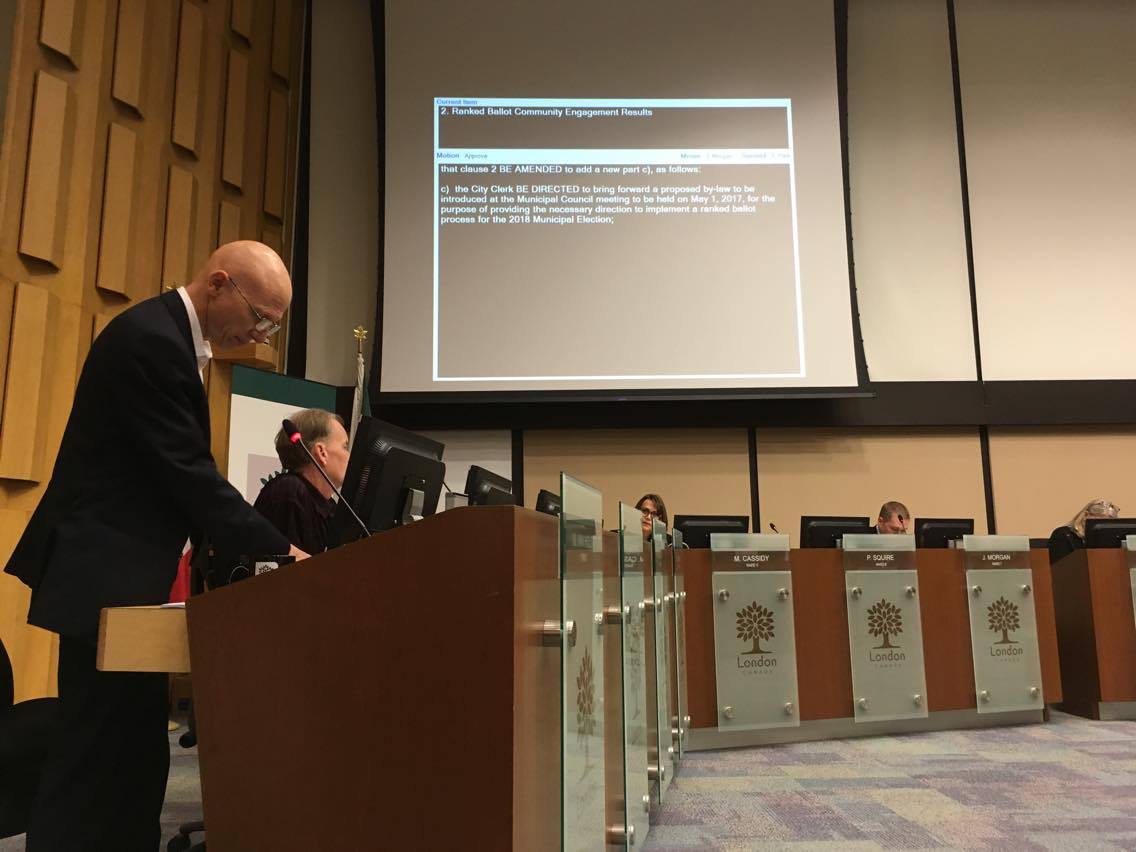When Londoners head to the polls next fall, they’ll have the option to rank council and mayoral candidates instead of choosing only one.

By a margin of nine to five, city councillors voted Monday night at a special meeting — hours before the midnight deadline set out by the Ontario government — to abandon first-past-the-post in lieu of ranked ballots.
The decision was met with great excitement from advocates — many of whom live outside of the city — while most Londoners responded with a shrug, at best.
If first-past-the-post was threatening the foundation of civic democracy, most people seem to have missed the memo.
The lead-up to the vote had eerie similarities to Prime Minister Justin Trudeau’s abandoned attempt to change Canada’s voting system. That discussion ended when Trudeau told his new democratic institutions minister that electoral reform wasn’t part of her mandate.
WATCH: Protests held across Canada against Liberal’s broken promise on electoral reform

It was a significant broken promise by the Liberals, who told Canadians unequivocally the 2015 election would be the last under first-past-the-post. After getting elected, however, it became increasingly apparent that few people really cared about changing things, save for those who change would directly benefit.
READ MORE: Trudeau confronted about electoral reform on International Women’s Day
I don’t fault activists for advancing reforms that would benefit them: who wouldn’t? It’s important that the rest of us recognize the self-interest in their advocacy, however.
Proponents of ranked ballots say voters will be more likely to support a “fringe” candidate if their votes can be later allocated to a more electable beneficiary. People are less likely to vote based on electability, in other words.
It doesn’t seem to increase the likelihood of fringe candidates actually getting elected though.
READ MORE: Trudeau cites Leitch, fringe voices when questioned on electoral reform
Ranked ballots benefit moderates because they make for palatable second choices. A right-winger would rather have a centrist than a socialist, and vice-versa. Even if someone gets 40 per cent of the vote on the first ballot, surpassing all other candidates, they could still lose.
The system penalizes those who run on bold ideas and policies.
The current system has its own flaws, of course, which is why any discussion of change has to be far more involved than London’s council’s was.
Regardless of one’s position on specific reforms, no elected representative should be able to change the rules on how they’ll seek re-election.
It was wrong for the Liberals to discuss reform without considering a referendum, just as it was for councillors in London to approve a change without one.
At least the Liberals told Canadians the reform was on the table. A small number of London councillors were forthright in the 2014 election about their hope to move away from first-past-the-post, but it wasn’t a significant election issue.
London is in the midst of a half-billion dollar rapid transit discussion, which has overshadowed any half-baked attempts at electoral reform engagement.
The City of London attempted to consult — I use the term generously — residents of the city. Just 815 people filled out an online survey on the subject. Among them, 52 per cent said they would prefer to vote for only one candidate in an election.
READ MORE: Results of London’s ranked ballots survey released
Half of those surveyed said they were in favour of changing to a ranked balloting system.
No other possible reforms were presented.
The city hosted four open houses to discuss ranked ballots and address people’s questions. Ninety-one people showed up — total. One meeting had a mere 12 attendees.
READ MORE: Council facing midnight deadline to approve ranked ballots for municipal elections in London
Even the federal Liberal government had more people show up at its electoral reform roadshow whistlestops.
Online engagement was more abysmal.
A report by London’s city staff said there were six Facebook posts and 14 tweets from Londoners weighing in. Perhaps the question should have been posed alongside a cat GIF.
Proponents of ranked ballots insist the current system gives too much power to a small group of people.
We hear this rhetoric about our federal political system as well. A party can have a majority in Parliament with only 39 per cent of the national popular vote.
These voices are blind to the hypocrisy of having nine people change our entire way of voting.
Nine people elected under a system they say is flawed, I might add.
If they’re illegitimately elected — based on their own contempt for first-past-the-post elections — how can any vote they cast on how democracy is enacted be legitimate?
This goes far beyond weighing the pros and cons of the status quo versus reform. Any serious discussion needs to engage voters directly through a referendum, not four tea parties and a handful of tweets.
If electoral reform were actually about democracy, it would be decided by the people.
To update the famous T.S. Eliot quote, democracy in London died not with a bang, but with a whimper.
Andrew Lawton is host of The Andrew Lawton Show on London’s AM980 and a commentator for Global News.








Comments